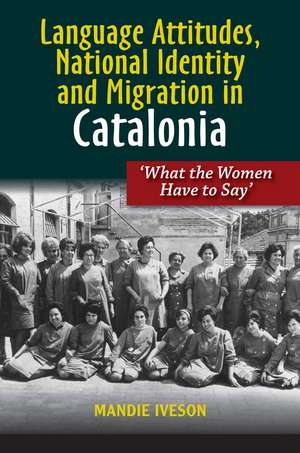Language Attitudes, National Identity and Migrat – What the Women Have to Say
Autoren Limba Engleză Paperback – 30 apr 2019
This book examines language, nation, and identity from a gendered perspective and investigates to what extent women use Catalan in their everyday social practices to construct gendered and national identities. Drawing on a unique body of oral history interviews, the focus of the study is three female 'generations', covering 50 years of historical change from the 1960s to the present. Mandie Iveson analyzes the preservation of the Catalan language during Franco's regime; how the emergence of a feminist movement and discourse, and changing patterns of migration, have transformed the relationship between gender and national identity in Catalonia; and the role that Catalan plays today in defining women's identities. Additional analysis of a corpus of social media data explores the online Catalan discourses of nationalism and its gendered dimensions.
Preț: 391.52 lei
Nou
Puncte Express: 587
Preț estimativ în valută:
74.93€ • 78.02$ • 63.32£
74.93€ • 78.02$ • 63.32£
Carte tipărită la comandă
Livrare economică 10-24 martie
Preluare comenzi: 021 569.72.76
Specificații
ISBN-13: 9781845199838
ISBN-10: 1845199839
Pagini: 264
Dimensiuni: 153 x 230 x 18 mm
Greutate: 0.42 kg
Editura: Liverpool University Press
ISBN-10: 1845199839
Pagini: 264
Dimensiuni: 153 x 230 x 18 mm
Greutate: 0.42 kg
Editura: Liverpool University Press
Cuprins
Contents Acknowledgments Introduction: Understanding Tunisian Francophone Women's Writing The 'Arab world' and the perserverance of stereotypes Tunisia Overview Why literature and why women's literature? On language On exile On counterpublic theory Authorial intention and the defence of anonymity Summary CHAPTER ONE Shame and Punishment in the Autobiographical Novel La Retourne by Fawzia Zouari and in the Novel Lela ou la femme de l'aube by Sonia Chamkhi Biographical information, synopsis of texts and narrative voices The protagonists' 'retournement' Shame The protagonists' 'retournement' Punishment The contribution to a subaltern counterpublic in Tunisia by Zouari and Chamkhi Summary CHAPTER TWO "Not Literature, Only "Almost" Literature": Essay Writing in Une force qui demeure by Hl Bji and in Les Arabes, les femmes, la libert by Sophie Bessis Unsettling the modernity vs. tradition debate The challenging of persistent traditional gender norms by Bji and Bessis The contribution to a subaltern counterpublic in Tunisia by Bji and Bessis Summary CHAPTER THREE The Personal is political: Old Adage, New Media. Blog Writing in A Tunisian Girl by Lina Ben Mhenni and in Nadia from Tunis by 'Nadia' Definition of genre: the blog or modern day diary The intimate dimension of blog writing The political dimension of blog writing The contribution to a subaltern counterpublic in Tunisia by Ben Mhenni and Nadia Summary Conclusion: Debunking the Myth of the Subservient 'Arab Woman' Overview of chapters Project limitations and directions for future research The authors' contribution to a subaltern counterpublic in Tunisia Notes Works Cited Index
